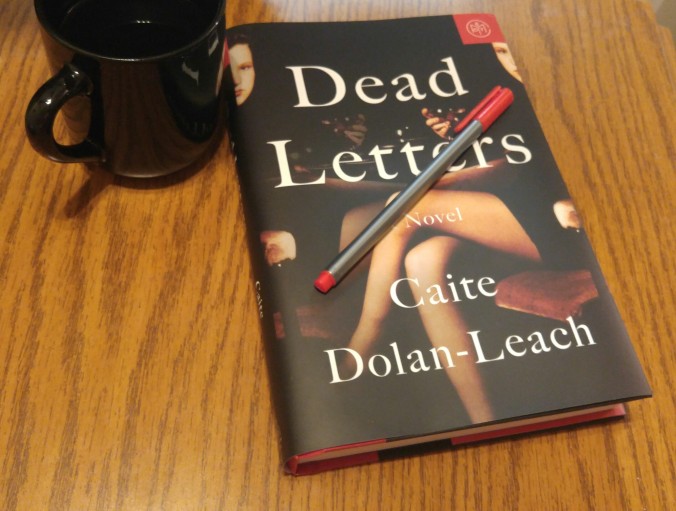
Dead Letters by Caite Dolan-Leach
I actually finished this one last month, during a bit of a blogging and reading slump. I was going to just shrug it all off, with firm resolve to do better in April, but a friend who also read the book asked to see me do a review of it. I’m happy to oblige, so here’s a moderately breezy summation of my thoughts about Caite Dolan-Leach’s debut novel, Dead Letters, and I solemnly promise not to slack so horribly again this month. (In fact, I’m already at work on more blog posts, so that might be considered as some money down on my promise.) The novel tells the story of a young woman named Ava who, while pursuing a vanity graduate degree in Paris, learns that her twin sister, Zelda, has been killed in a barn fire back home in Western New York. She returns home and, as is the way in literature, learns that everything is a mess. Her mother is an alcoholic with dementia; her father, also an alcoholic, has returned home as well but is being distinctly unhelpful; her old high school boyfriend is tempting her away from her dreamy Parisian boyfriend, left behind for what was supposed to be only a short trip; and, worst of all, it seems that the bodily remains found in the burnt-up husk of a barn actually may not be her sister’s. The evidence for this last bit: Zelda keeps emailing Ava, and leaving handwritten letters around the family homestead, and otherwise making herself very, very present even while her funeral is being planned. The mystery is, plainly enough, from whose body did the ashes in the barn originate? Is Zelda really dead?
Dolan-Leach presents her evidence, for and against, in classic Oulipo fashion: the novel is structured around the unveiling of clues presented in alphabetical order. The story doesn’t crumble around the difficulties imposed by these technical concerns, though some of the more outlandish aspects of the narrative seem, at least in part, a consequence of the superimposed structure (supposedly Zelda, a young unemployed person with a disastrous financial history, managed to secure herself an unbelievably large personal loan shortly before her maybe-demise, as one example). I found myself cheerfully chalking all of these unbelievable bits up to the axiom that weird shit happens all the time, especially in Western New York (I lived nearby-ish to Ithaca for five years and I’ll believe any insane bureaucratic story from those parts, honestly), so all of that bothered me less than it might have in a different book.
I was a tinge more bothered by the narrator’s unpleasantness (like everyone else in her family, she’s an alcoholic, though she’s fairly cognizant of the fact; she doesn’t think kindly of or behave nicely toward any other character in the book unless she needs something from them; and her inability to recognize the projected self-hatred in her anger toward the hedonistic Zelda was a source of much aggravation for me). There was enough about Ava to sympathize with, though, that a redeeming balance was struck, and while I wouldn’t add her to a list of characters I’d like to share a bottle with, I enjoyed unraveling her complexity along with the mystery. In particular, it was refreshing to read a full-blooded exploration of the miseries of being a presumed caretaker and the difficulties of breaking free from the young woman as nurturer stereotypes that so often go unexamined in literature as in life.
I also adored getting to vicariously reexperience New York wine country culture, so this book has a place on my shelf for the foreseeable future. I’m excited for Dolan-Leach to write her next one! 4/5.